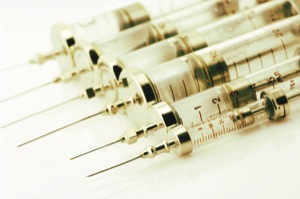
The Clean Syringe Exchange Program received its 1.5 millionth dirty needle in 2011, having broken the one million mark in 2010. The program started in 2002 as an attempt to stem increases in infections from HIV/AIDS and hepatitis C.
Two discreet mobile units in downtown San Diego and North Park allow drug addicts twice a week to exchange an unlimited amount of dirty needles in exchange for up to 30 clean ones. They cannot get more clean needles than they turn in.
“Can you imagine a pile of a million-and-a-half dirty syringes?” Dr. James Dunford asked San Diego City Council during a session earlier this month. “What that would look like, and where they would be if we hadn’t had this program?”
Dunford is the city medical director for emergency medical services. Dunford said the program also helps city workers avoid coming across dirty needles.
“We want to protect the public, the police, emergency workers, environmental-service workers who in the past have been regularly exposed to dirty needles in the trash, in parks, at beaches,” he said.
“It is improving the health of this city,” said Dunford to the committee. “It is a scientifically proven public health strategy that reduces HIV/AIDS and also hepatitis C. It has the endorsement of the U.S. Surgeon General, Center for Disease Control, and all major health organizations.”
The report released “disturbing changes” in the median age of users, said Jennette Shay, of Family Health Centers of San Diego, which administers the program and pays for $75,000 of its $124,000 budget.
The new median age is now 31, but in 2006 the median age was 41. More young people are using heroin or other IV drugs, said Shay.
Most users of the program were male, at 69 percent, with females at 31 percent, and 1 percent said they were transgender. Three fourths of them, 76 percent, were white, 13 percent were Hispanic, and 4 percent were African Americans. Other races listed at 7 percent.
Only 29 percent of addicts were employed, but 75 percent of them were high school graduates, a statistic that surprised 8th District David Alvarez. Only 10 percent were married, with 15 percent of addicts who said they were divorced, widowed or separated.
Shay said there were people who drove down from La Jolla to dispose of their dirty needles, either for themselves or their sons. She said mothers who drop off their children to school some mornings make a stop to the mobile unit to drop off dirty syringes.
“We’re connected with people who wouldn’t come into our system in any other way but through this mechanism,” said Shay.
Third District Councilman Todd Gloria said everyone has to talk to a counselor before getting any clean needles. The goal, said Gloria, “is about getting people clean. It is about having them stop using drugs.”
Shay said counselors encourage users to reduce the number of times they shoot up drugs. She said the program “has never increased drug use or encouraged people to start drug use.”
Gloria said he visited both sites and praised the discreetness of it. “This program is run so professionally, with minimal impact to the surrounding community. It’s extremely well run,” he added.
The program has accepted 164,223 syringes than it dispensed since it began, and each year more dirty needles are accepted than distributed. This year there were 829 new clients out of 11,872 visits. Each addict gets an identification card they must show to get clean needles.
The report says 142 people were referred to substance abuse treatment, 114 to detoxification services, 88 to mental health treatment, 391 referrals to primary care, and 123 to other programs. Shay said there were fewer referrals this year due to local and state cuts to programs.
Committee chair Marti Emerald said she would be sending a letter to the County Board of Supervisors about the program and hoped they would respond positively by Dec. 1, which is World AIDS Day. The Board of Supervisors is opposed to the program.
There were no public speakers against the program. Also attending was Councilmember Lorie Zapf. The report is required under a state law to be given to a city with a clean syringe exchange program.











The syringe exchange trailers serve a lesser noted service of disposing of used needles from diabetics and others who are required to inject medications and vitamins. After much research, I discovered that this was the only location that will accept the medical items. Doctor offices and pharmacies used to take them back but all I contacted claimed that it was cost prohibitive.
I lent my voice to support the syringe exchange program because I think it saves lives by curbing HIV and other diseases. That was before I was diagnosed as diabetic. Now I know the other valuable service they provide.